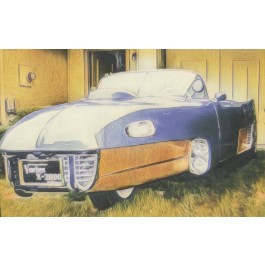Browse By
|
1962 Vortex X 2000Description1962 Vortex X 2000This was the future according to one radical hot rod builder of the Sixties, Jerry Woodward. He called it the X-1970, which became the X-2000. You had to see it to not believe it. Jerry Woodward unveiled his home-built three-wheeler at the February 1962 Grand National Roadster Show in Oakland, California. It represented Woodward’s vision of a ‘car for the next century (that is) ready for radar roads’. The X-1970 Vortex, as it was dubbed initially. The car took six years to make, Woodward operating out of a car glass replacement facility in Provo, Utah, which he co-owned with his father. Basis for this remarkable machine was a tubular steel chassis with a 133in wheelbase. An overbored 345cu in Lincoln V8 was mounted in the rear of car and allied to a three-speed transmission. According to the media of the day, “the Vortex was packing a healthy 450bhp”. Rear suspension was by swing axles and Chrysler- derived torsion bars, the front end comprising a fork-type arrangement. Woodward made the body himself, hand forming it out of 20-gauge steel. He described the outline as being ‘Delta-shaped’ in order to help it cleave the air efficiently, an integral roll bar being concealed within the windscreen frame on safety grounds. The so-called ‘Uniscope’ dashboard was in reality a modified 1950 Nash item which gained a small TV set along the way (an antenna was sunk into the driver’s headrest). At the rear of the car, a red Lucite tail-light cluster was incorporated into an adapted 1958 Lincoln rear bumper. Completing the ensemble was stratosphere blue metallic paint and surf white upholstery. The V8 trike was met with much hoopla, and not just in the US. Newspapers and other media outlets the world over ran stories on the car – it even made headlines in Russia. It was touted as a car of the future, the ‘1970’ part of the tag relating to the year, Woodward predicting that some of its design features would be found on production cars by then. He subsequently changed it to ‘2000’ as it had a certain next century vibe about it. While you might expect a long-wheelbase three-wheeler packing a rear-sited engine and swing axles to be a mite unstable in the twisty bits, Woodward claimed you could make a right-angle turn at 60mph in complete safety. According to Car Craft, the car had also been put through its paces on the Bonneville salt flats where Woodward exceeded 150mph. The magazine’s report concluded with: “…a tremendous amount of well-thought planning makes the futuristic X-2000 a real sweetheart!” The car went on to claim six major car show awards and in later years it formed part of a small museum of Woodward’s creations which closed in the 1990s. The X-2000 still exists, providing further proof that the future was far more fun in the past. Detailed Information
Additional InformationAdditional Information
|



